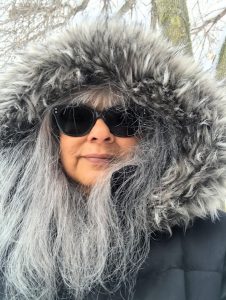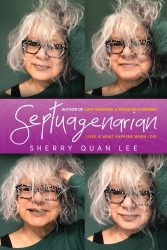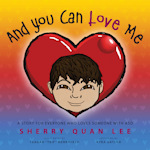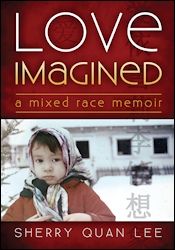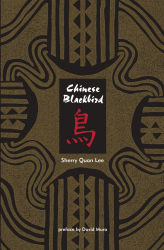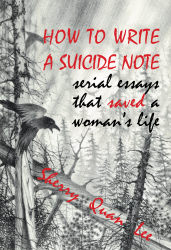“I Give You Back”– “I release you, my beautiful and terrible fear / I release you …. I am not afraid to be angry / I am not afraid to rejoice …”–Joy Harjo
I’ve been known to be angry. I react. And, no I’m not bi-polar as some have labeled me. I didn’t, I don’t, I wouldn’t take those accusations lightly. I’ve been to therapy. I was never diagnosed as bi-polar. Though there should be no shame if there was such a diagnosis. Just as there should be no shame in being Black/Chinese/Female/. Nor guilt in reacting. I do get angry when racism and sexism become provocateurs of shame, of trauma, of violence.
Eden Torres wrote in CHICANA WITHOUT APOLOGY:
We have the right to be angry no matter how long ago the original trauma occurred or how different things were then, no matter how much progress has taken place, no matter how ignorant or well-intentioned our oppressors have been, no matter what change is promised in the future. Our fury is justified anytime we are ignored, silenced, negatively stereotyped, incorrectly labeled, or otherwise not respected. Any occasion in which our history is omitted or lied about deserves our indignant dismissal.90 Until equality and justice become reality, we have a right to be angry. Page 41 Eden gave me permission to be angry.
Wang Ping was angry. She wrote a poem, “What Are You Still Angry About.” The poem moves forward by a lengthy rewriting of family genealogy—along maternal, instead of paternal lines.
But I must be an ungrateful beast/because I always feel like screaming with my broken voice./How can I explain the anger that prevents me from breathing?/I want to scream/every time I bow to my family tree which hangs in the clan hall./It records the men of Wang family for over fivty generations/whereas the names of my female ancestors/just vanish like tadpole tails../I scream, but I have no voice./So I write this genealogy along maternal lines.
…
The need to speak/leaves me restless like a hunger./My words may not say what I mean,/but they’re my only means./I must scream through my voiceless throat,/even if I have to burp and fart,/and suffer from chronic diarrhea./I don’t care./I’m tearing myself and this world apart,/to find out why I’m still angry.
Anger is why I write, writing to undo self-loathing-what Jesmyn Ward in her memoir wrote:
We are never free from the feeling that we have failed. We are never free from self-loathing. We are never free from the feeling that something is wrong with us, not with the world that made this mess.”—Jesmyn Ward, Men We Reaped a memoir, 2013, Bloomsbury USA, New York
And Dorothy West’s narrator in The Wedding said: bigotry’s most monstrous crime, more damaging than a laundry list of physical indignities because it amounted to a mental rape, a theft of personal dignity.”
What is personal dignity when one is brought up to be someone she isn’t because black is not safe. Jim Crow is prevalent, even here in Minnesota Nice.
Perhaps not a very smooth transition-critics have said I don’t write non-linear well, even though non-linear is most likely the result of trying to write linear well-the universe has led me in a different direction. Instead of anger, I want to think out loud about Social Media and how it relates or doesn’t to my identity as a mixed race Chinese Black woman who grew up passing for white.
I find social media to be provocative. Provocative which is exciting and stimulating YET incendiary and inflammatory.
Merriam Webster: Synonyms of provocative. charged, edgy, exciting, inciting, instigating, instigative, piquing, provoking, stimulating. Words Related to provocative. explosive, fiery, incendiary, inflammatory, triggering.
Recently I have been weaning myself from social media. I’ve deleted my Pinterest, Instagram, and, yes, my Twitter accounts. FB I have been tweaking, but not yet, but soon, will also go the way of annoying social media accounts. Annoying perhaps not a strong enough word.
The ads, no sooner do I click that I’m not interested in seeing ads like this or ads from a particular business-who wants to see ads at all on social media, but then another one pops up and another. I see a post of a cute kitty or a friend’s baby and while I’m marveling at the cuteness the next an ad for the cheap but utterly stylish pair of shoes catches my eye and I have to use will power not to click open the link but instead click no I don’t want to see stylish shoes or clothes or recipes-okay I do like the recipes the photos of scalloped potatoes or cake, but I don’t , usually, click on them.
What’s even more annoying than the ads are those you’ve been selected; you have won pop-ups that you can’t get rid of. There’s no x in the corner to opt out. Believe me I haven’t won anything except a headache.
I do like the calendar of events which are categorized by day, by weekend, etc. I think it’s more concise than other Twin Cities event links you can google. But why do I want FB gurus to tell me what events my FB friends are interested in-I probably wouldn’t recognize many of them even if I went to the same event, nor them me. And basically, the gurus have yet to realize I’m 70, I seldom drive at night, and I don’t go to many events other than daytime senior priced movies. But, personal invites are nice, I’ve personally created events for readings I’ve curated and personally invited writer friends I think would be most interested.
And, have you noticed how much duplication there is with social media. When I suddenly realized I’ve seen the same post on Twitter, on Instagram, and also on FB-I begin not to pay much attention to any of them.
But what unnerves me the most, getting to my focus which is A GOOD TIME FOR THE TRUTH, are the in-my-face proclamations of the political-think the once popular adage the personal is political- nature posts in my news feed. I think of the term micro-aggressions.
Micro-aggressions are the everyday verbal, nonverbal, and environmental slights, snubs, or insults, whether intentional or unintentional, which communicate hostile, derogatory, or negative messages to target persons based solely upon their marginalized group membership. https://www.psychologytoday.com/
I think of micro-aggressions as slaps to the face, kicks in the butts and as a mixed race women who grew up passing for white who believes in God, but not religion. I get kicked and slapped from so many hands and feet coming from this direction and that direction (not to say I’ve never done a bit of slapping or kicking also, but seldom). Who hasn’t been slapped and kicked? Who hasn’t done their share of the same?
What exactly are we communicating/not communicating to each other? Are we communicating/affirming our beliefs to the choir? Is it a battle he said/she said we said/they said of the 21st century? Are we making friends or enemies? Who actually is listening to us on social media. Apparently on FB not many. Although we may have thousands of friends, or a mere two or three hundred, big brother decides who sees our posts and what posts we see-I think the limit is 24?
Someone once called me a righteous bigot. I knew he was wrong. But I knew what he meant. I think now that’s what subtle and not so subtle microagressions feel like. I feel I’m constantly being slapped on FB with “friends” righteous attitudes-many I agree with, less than I don’t. I think wow, there are a lot of righteous bigots in this world. And they are screaming at me on a “social” media. And that screaming is traumatizing. Particularly for me, it’s traumatizing because I am mixed race and grew up culturally white so I don’t fit into one I’m screaming at you category.
I have mixed emotions thinking about leaving FB. It can be informative, it can be funny. It can make a lonely person less lonely. I have a page dedicated to writing events, especially events the writers in How Dare We! Write are involved with.
But it can also be traumatic, exhausting. I have two groups on FB I really like Thrifting Divas and Creative Writing Pedagogy. But, to be inclusive to who I am there’s also Asian groups, African American groups, mixed race groups, and subgroups of those groups and I feel bombarded by the wonderfulness of inclusion, yet the trauma of the time and effort it takes to belong.
When we post a link to an article to our FB Newsfeed without comment are we shaking in our boots, not brave enough to share our opinion? Or do we share our opinion as God given truth, the only truth? Are we brave enough to comment on a post that truly makes us angry when we have facts to offer that might shed light on someone’s righteous attitude? I’ve done both, but neither seems satisfactory. Does any of it really matter?
Naomi Littlebear, excerpt from THIS BRIDGE CALLED BY BACK, edited by Cherrie Moraga and Gloria Anzaldúa wrote “Complacency is a far more dangerous attitude than outrage.” But is FB the environment for outrage?
Many of my FB friends don’t know me; I don’t know them-we wouldn’t recognize each other on the street or be able to address each other by name.
My life has straddled cultural boundaries for 70 years. I have yet to find a home that isn’t porous. Even with the emergence of mixed race communities I find the communities are mostly young and hip and political; and often more black and white than diverse.
I’ve discovered if a person writes for a long enough period of time the reason for the writing emerges. I was writing to send my swan song, eventually, soon to my FB friends, but it became the focus of what I didn’t know I wanted to say today.
Who we are matters. Who we are is complex and complicated. Who we are changes over time; identity is fluid. I have discovered who I am thru my writing and the writing of others. My mother gave up her Black relatives to protect me from the Jim Crow era of atrocities. My siblings, I imagine, have given me up for undoing that protection. We each have our own unique story. I have only my story to offer. And my story, as I’ve aged, is changing.
On becoming 70 I notice I’ve become less righteous, less angry, and mostly tired. Someone asked if I didn’t care about race, about equality any more. I was shocked and dismayed by the question. Of course I care. I live “racism” every day. That’s why I continue to write, that’s why I encourage and work with other, especially POC writers. But my attitude has changed. My mantra is to be humble. Be kind. Be joyful. Not to be righteous, but only to suggest: If you’re going to shout, shout Amen and hallelujah. Don’t give your life away. Positive change is slow to happen. Don’t be a martyr. But stay informed, stay aware, and choose to be active in ways that are meaningful to you and to others while at the same time taking care of you.
I don’t fit in a box. No matter how many boxes there are to check on the Census, on health forms, on school forms, etc. I don’t fit in a box/or boxes. If you want to know me, invite me for coffee or a glass of red wine. Or read me. Read my books.
“Words , I see now, are the defining shape of a human spirit. Without them, we fall. Without them. There is no accounting for the human place in the world. Language is an intimacy not only with others, but even with the self. It creates a person. Without it, in the dawn, in the dark of night, there is no way to know who or what we are.
“One day the words came. I was an adult. I went to school after work. I read. I wrote. Words came, anchored to the earth, to matter, to the wholeness of nature. There was, in this, a fall, this time to a holy ground of a different order, a present magic, a light-bearing, soul-saving presence that illuminated my heart and mind and altered my destiny. Without it, who would guess what, as a human being, I might have become.”— The Woman Who Watches Over the World, Linda Hogan page 56-57
Like Linda I was silent. I was afraid, not really sure what I was afraid of. But words came in the form of writing/not speaking. In fifth grade a poetry club, a journal. Pitter Patter the Rain Does Splatter. 7th grade a literary journal. High School. Creative writing club-crush on a boy.
I became who I am before I was born; born of slavery; born of a Chinese father and a Negro mother into a racist world that cursed me into being white. History became me, until I became myself.
Until words appeared, at first just silly fifth grade rhyming poems-about rain. Then poems to impress, in high school, the poet nerd I had a crush on. Soon after, words became explanations and rants and hellos, but mostly goodbyes to lovers, to husbands, to in-laws to white people who for their own comfort and ease didn’t want to discuss race, didn’t want to learn about me.
In my twenties and thirties and forties and fifties-an academic education taught me words that had been missing -taught me who I am and the difficulty that is me, taught me all about oppression and white privilege.
I took that learning underground, formed books of verse that said I now know how oppression-how racism, sexism, gender, and now ageism- has formed my identity; each book a closure, a new beginning. But that’s a lie. Each book demanded more, what wasn’t I saying?
Until poetry became not enough, became a gathering of metaphor that only I understood. And then prose dared me to dig deeper, to go underworld, beneath my own damned ego, to fill in the blanks, to cement the bricks with mortar. And here I am, finally ready to enter a world larger than myself and my story.
I am not going to read from a Good Time for the Truth. If you are one of the 20,000 readers that have bought the book, you’ve probably already read my story. Sun Yung Shin when she invited me to submit my story she countered it with but don’t tell anything you’ve already told before, not anything you’ve written in your recent memoir Love Imagined a mixed race memoir. I’m going to read a story from my memoir, Love Imagined, that isn’t repeated in A Good Time for the Truth. A story that reveals how complicated race is, how it affects families. And why equality matters. (IF IT WALKS LIKE A DUCK)
I retired from teaching creative writing a year ago. For a quick promo: I always wanted a book on craft by WOC to use as a text book. There weren’t any that I knew of at the time. After my retirement my publisher said write the book. How Dare We! Write: a multicultural creative writing discourse by Modern History Press
Synopsis: How Dare We! Write: a multicultural creative writing discourse offers a much needed corrective to the usual dry and uninspired creative writing pedagogy. The collection asks us to consider questions, such as “What does it mean to work through resistance from supposed mentors, to face rejection from publishers and classmates, and to stand against traditions that silence you?” and “How can writers and teachers even begin to make diversity matter in meaningful ways on the page, in the classroom, and on our bookshelves?”
“So-called “creative writing” classes are highly politicized spaces, but no one says so; to acknowledge this obvious fact would be to up-end the aesthetics, cultural politics (ideology) and economics on which most educational institutions are founded How Dare We! Write, a brilliant interventive anthology of essays, breaks this silence.”
–Maria Damon, Pratt Institute of Art; co-editor of Poetry and Cultural Studies: A Reader
I believe who we are influences our writing, just as who we are may defy those who think they have power over our writing. I knew in my heart that for writers of color, writing isn’t just about process and
craft, but also the challenges we face as writers, and how we overcome those challenges. I imagined a textbook that gives support and encouragement to those of us who understand that one size doesn’t fit
all, that MFA programs don’t necessarily address our needs, nor do publishers necessarily accept stories that don’t fit their agendas or economic needs. I wanted a textbook that considers the relevance of
race, class, gender, age, and sexual identity; culture and language; and that by so doing, on some level, facilitates healing.
In ending,
Joy Harjo wrote the poem, “I Give You Back”– “I release you, my beautiful and terrible fear / I release you …. I am not afraid to be angry / I am not afraid to rejoice …. But come here, fear / I am alive and you are so afraid / of dying.”
Clarissa Pinkola Estés writes in WOMEN WHO RUNS WITH WOLVES, “What must I give more death to today, in order to generate more life.”
I give death to anger by writing what I am angry about. Again. Again. And again. Between each death I am joyously alive. Between each death I have gained understanding and shut out self-loathing and shame.
“I died once. And then I died again. And then, death had no hold on me.”
— Jacqueline Woodson, AUTOBIOGRAPHY OF A FAMILY PHOTO by
Note: I wrote this for a presentation some years ago. Revisiting it again today, October 16, 2025, because today’s political climate demands OUTRAGE.
Complacency is a far more dangerous attitude than outrage.
–Naomi Littlebear Moreno
Also, I deleted my FB account December 2024



